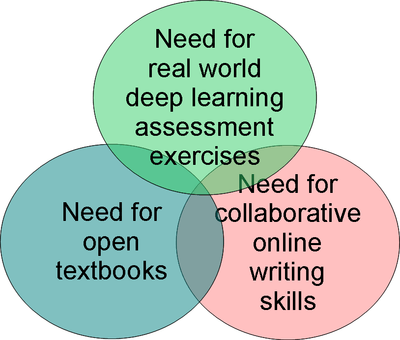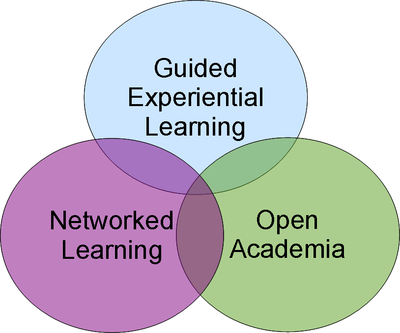Motivation and emotion/Textbook/Pedagogy
< Motivation and emotion < TextbookPedagogy for student-developed textbook chapter exercises
This page explores three higher education needs and underlying pedagogy for using student-developed open textbook chapters as learning and assessment exercises.
Three higher education needs
This project address three higher education needs (see Figure 1).

Open textbooks
The higher education industry should at least agree on one thing when it comes to textbooks: the current system for publishing, distributing and pricing is rather broken. The challenge lies in reimagining the textbook so that faculty construct the right set of learning materials that engages their students in deep learning, without bankrupting them. (Bell, 2010)
Commercial, restricted textbooks are ubiquitously used in higher education. However, there are significant issues with this approach including high cost, copyright restriction, limited formats, lack of localisation, and inequitable accessibility (Bell, 2010). Open textbooks are a promising alternative, but there are relatively few available (Cervantes, 2010; Holland, 2008; Make textbooks affordable, 2010; Reynolds, 2010).
Assessment for the future
Universities face substantial change in a rapidly evolving global context. The challenges of meeting new expectations about academic standards in the next decade and beyond mean that assessment will need to be rethought and renewed. (Boud, 2010)
There is a need to develop innovative, learning-relevant assessment methodologies in higher education (Assessment Futures, 2010). In particular, assessment exercises which generate deep learning, facilitate generic skill development, and which have real-world applicability are desirable. The proposed textbook chapter authoring exercise exhibits seven out of the eight suggested Assessment Futures elements:
- Actively engaging students in learning tasks: Students negotiate and select their own unique topic, brainstorm content and learning features, and develop an open textbook chapter and accompanying multimedia presentation.
- “Authentic” and investigative activities: Students work on a “real-world” textbook which has on-going value; investigation is needed to develop appropriate content for specific topics.
- Integrative tasks: The exercise involves integrating theory and research, individual and collaborative writing, and on- and off-line learning (blended learning).
- Becoming aware of learning and judgement: Chapter development takes place in openly editable wiki environments, facilitating continuous informal peer review, with more formal peer review through tutorial exercises and direct feedback from staff.
- Modelling and practice: Teaching staff and members of the public write and co-edit chapters to help demonstrate ways the work can be improved.
- Working with peers: Tutorials include group brainstorming and peer feedback on textbook chapter content development. Small group discussions facilitate reflection and feedback about e-portfolios and chapters.
- Giving and receiving feedback: Students are encouraged to seek feedback from peers and staff on chapter plans and drafts in tutorials and via online communication.
Collaborative online writing skills
Once basic academic writing skills have been developed (e.g., through writing essays on set topics), higher education students should develop a capacity to write effectively in collaborative, online environments and to undergo peer-review.
The theory – Three pedagogical elements
To guide the design of the student-authored open textbook learning and assessment exercise, aspects of three pedagogical theories have been used (see Figure 2).

Guided experiential learning
Guided learning by doing and reflecting (Dewey, 1938/1963; Kolb, 1984). Authoring an online textbook chapter and creating an accompanying 5 min. multimedia presentation are novel, challenging exercises. By directly encountering unfamiliar problems, with guided support and reflection, students develop their writing and communication skills and also confidence and capability in their problem solving and project management skills. See experiential learning.
Networked learning
Learning through online collaboration and interactivity (Ally, 2008; Siemens, 2005). Students are immersed in face to face networks (through small groups, tutorials and lectures) and a collaborative, networked digital environment where they share their work openly. Lectures and tutorials include guidance and peer-review exercises to facilitate chapter draft development of the chapter content. Networked learning skills (such as collaborative editing) are developed and facilitated. See networked learning.
Open academia
Freedom and openness of knowledge and learning opportunities (Neill, 2010a, 2010b). Open academia is a philosophy that values openness of knowledge and access to learning opportunities, with an emphasis on open education, open access, open formats and open licensing. This exercise immerses participants in an open education environment and helps them to understand the applicability of open academic practices to real world problems and tasks. See open academia.
Project deliverables
The project will support developing, describing, evaluating and disseminating a methodology and pedagogy for student-authored open textbooks as learning and assessment exercises. More specifically, the proposed project will undertake to:
- Conduct an online textbook assessment project (as part of 7124-6665 Motivation and Emotion, Semester 2, 2010), including training students in wiki and multimedia skills, intellectual property and open licensing, step-by-step guidance for student authoring of chapters, staff and peer feedback on plans and draft chapters, student recording of 5 min. multimedia summaries of the chapters, marking and feedback of the chapters and multimedia, collation of the final electronic book and multimedia showcase, and printing and distributing the books.
- Conduct an evaluation study of students’ e-portfolio comments and formal mixed-methods evaluation of the textbook authoring exercise.
- Seek and collate peer-feedback about the textbook chapter project from Reference group (Janie Busby Grant and/or Amanda George, Leigh Blackall, Ben Rattray, John Dodd and students to be invited).
- Write a paper for publication about open academic teaching pedagogy and the online textbook authoring exercise and/or present at a related higher education conference.
- Develop generic guidelines and suggestions about how to utilise an online textbook authoring assessment exercise.
- Provide a hands-on workshop about how student-authored open textbooks can be used as a learning and assessment exercise.
- Contribute a summary of the project to the Assessment Futures website.
- Investigate potential external grant funding (e.g., ALTC) for further developing and supporting student- and staff-authored open source textbooks.
The proposed project is currently underway here:
- http://en.wikiversity.org/wiki/Motivation_and_emotion/Assessment/Chapter
- http://en.wikiversity.org/wiki/Motivation_and_emotion/Textbook
Budget
The project budget is expected to involve:
- Conference attendance support
- Books about assessment and blended learning pedagogy
- Graphic design for diagrams and illustrations
- Open textbook printing
- Donation to Wikimedia Foundation for free server hosting
References
- Ally, M. (2008). Foundations of educational theory for online learning. In Anderson, T. (Ed.) The theory and practice of online learning.
- Assessment Futures (2010). Assessment futures. University of Technology Sydney.
- Bell, S. J. (2010). Taming the textbook market. Inside Higher Ed, 11 June, 2010.
- Boud, D. et al. (2010). Assessment 2020: Seven propositions for assessment reform in higher education. Sydney: Australian Learning and Teaching Council.
- California Free Textbook Initiative (2010). CA free textbook initiative.
- Cervantes, T. (2010). Online textbooks promoted as low-cost alternative. The Guardsman, 29 April, 2010.
- Dewey, J. (1938/1963). Experience and education. New York: Collier.
- Holland, G. (2008). Free digital texts begin to challenge costly college textbooks in California. Los Angeles Times, 18 August, 2008.
- Kolb, D. A. (1984). Experiential learning: Experience as the source of development. New Jersey: Prentice-Hall.
- Make textbooks affordable (2010). Make textbooks affordable.
- Neill, J. T. (2010a). Going naked – Openism and freedom in academia. Wikiversity.
- Neill, J. T. (2010a). Open academia – A philosophy of open practice. Slideshare.
- Reynolds, R. (2010). The transformation of textbook publishing in the digital age - Specific product opportunities. the xplanation, 22 June, 2010.
- Siemens, G. (2004). Connectivism: A learning theory for digital age. International Journal of Instructional Technology & Distance Learning, January.